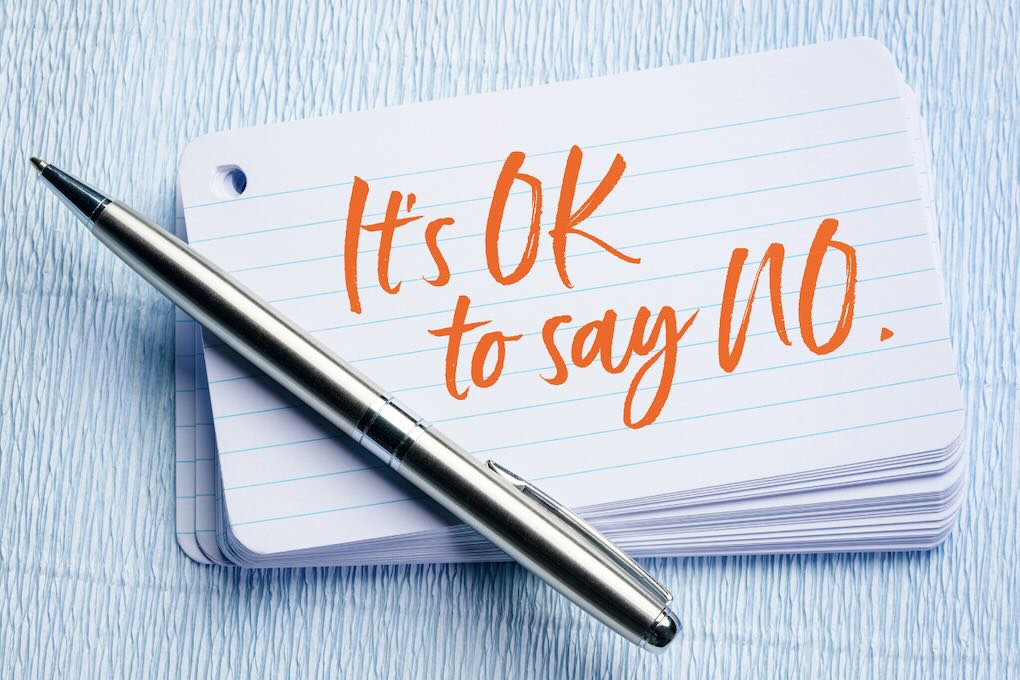We love to say Yes! to our spouse. It is so good to be supportive and encouraging. It seems like if our loved one wants something, it is the best thing for them. You want to go back to college? Yes, let’s make that happen! You want to change jobs? Yes, I want you to enjoy your work! You want to buy a new car? Yes, you should have reliable transportation. It seems like love requires us to say yes to what they want. The surprising truth is that sometimes love says No.
To love someone is to want the best for them. More than wanting the best, love works to bring out the best in our spouse. Let’s be real: there are times that our spouse’s desires or behaviors are not their best. When our spouse’s behaviors are destructive to themselves, your relationship, or others, it is important for a spouse to say, This is not a good thing. This behavior should stop. Here are a few examples:
Behaviors that are Destructive to Your Spouse

Consider if your spouse’s consumption of alcohol increases. We would say, No, the direction you are heading is not good for you. We would say no to any compulsive behavior our spouse is engaged in – spending, using drugs, overeating, beauty treatments, and so on. We know intuitively that these behaviors will destroy our spouse. It is love to say no to them.
Behaviors that are Destructive to Your Relationship
We say no when our spouse’s expression of anger has gotten out of control on a regular basis. Lashing out, calling names, and using threats destroys connection and needs to be stopped. We would say, No, you can’t call me that name.
It would be destructive to a relationship for a spouse to spend frequent alone time with a friend of the opposite sex. Boundaries protect the trust and intimacy in a marriage. We would say, No, you can’t spend that kind of time with her (or him). It would be too hard for us to stay an “us.”
A Christian client once asked me – quite honestly – “Is it ok for me to stay married to my husband?” and not pursue the man she was having an affair with? “Isn’t that wrong somehow?” she asked. You see, she’d been swimming in the message that it’s virtuous, even necessary, to live out one’s authentic self. If she had such strong feelings for this man…wasn’t she denying what was true?
In the opening paragraph, I mention changing jobs, returning to school, and purchasing a car. These choices may be no problem at all for your family. However, if a spouse’s continual drive for change puts too much pressure on the family’s stability or finances, it might be necessary to say No, I can’t support this shift or maybe Not yet. It is love to set limits on behaviors that make it impossible to maintain a close relationship.
Behaviors that are Destructive to Others
A spouse that is engaged in stealing or unethical behaviors should be told No, I don’t want you to hurt others. We limit gossiping as well because it is another behavior that hurts people. Our spouse likely does not want our input, but once again, these behaviors are not the best your spouse has to offer. When you step into this conversation with your spouse, you are displaying your committed love for them. Most people would just walk away.
Love doesn’t Stop at No
The difference between loving our spouse and controlling them is that love doesn’t stop at no. We say, No, I won’t let you slowly die by overeating…let’s talk about what’s going on for you. Love enters into the struggle to pull our spouse toward life. The struggle usually includes some form of consequences with the goal of motivating your spouse to choose life.

The problem is that consequences are often painful to both spouses – this is why it is sacrificial love. It may be that you need to limit your own behaviors to make it a little easier for your spouse to stop something they struggle with. It may be harder to relate to your spouse when they aren’t engaged in the destructive behaviors (think about an alcoholic that is more fun when they are drunk). Nevertheless, we enter the struggle because we love our spouse despite the increased pain for us.
It’s Hard to Say No
It’s very hard for some of us to say, No. (If it’s easy for you to say no, this blog is not for you – you probably already say no too much!) It’s hard enough to say no to acquaintances, but even more so with the person we’ve committed to for life. There is a cost to saying no: When we say no, our spouse will feel disappointment. We also feel our spouse’s discomfort. We may even take on the brunt of our spouse’s reactive anger
Saying no is so hard, I found it difficult to write this blog encouraging you to say no. There is a very powerful cultural narrative that autonomy is most important; that is, we should let everyone do whatever they want. We discourage intervening on anyone’s “happiness.” However, this view denies the fact that we don’t actually know what makes us happy (Check this out in The Good Life). It also ignores the fact that we are all interconnected. We impact each other – sometimes quite negatively. If your spouse is acting in ways that are destructive to themselves, your relationship, or others, many people suffer. Because cultural influences prevent most of us from intervening, it is all the more important for spouses to step in and say no to destructive behaviors.
Remember the End Goal
Remember the end goal of setting a limit – you believe the limit will help your spouse become better. Your limit has a purpose that extends beyond your spouse’s pain. We may hurt them for a time, but the ultimate goal is growth. I’ve come to believe it takes great strength to be married well. It takes incredible strength to say no in love. You may be the only one strong enough to go to battle for your spouse.

Call me if you’d like to have me speak at your event about these kind of things!

